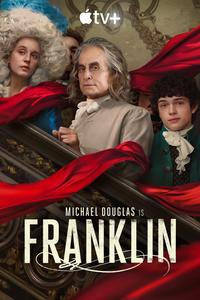I don't know much about history, but I know what I like. That's not quite true. Though I'm no historian by any definition, I do read history books occasionally, and am addicted to film and TV adaptations. In fact, I've been on something of a historical viewing binge lately

|
|
| (courtesy AppleTV+) | |
The most recent example is Franklin, premiering today on Apple TV+ with the first three episodes, to be followed by one new episode every Friday through May 17. Starring and executive produced by Michael Douglas, the eight-part limited series is based on Stacy Schiff's book A Great Improvisation: Franklin, France, and the Birth of America. The creative team includes writer and executive producer Kirk Ellis (John Adams) as well as writer and executive producer Howard Korder (Boardwalk Empire).
Although I tend to be an anti-binge-watching TV traditionalist (patience is an underrated viewing pleasure), I've already seen the complete series thanks to the small miracle of advance screeners. Franklin is a great ride, and Douglas brings just the right blend of wit, intelligence, charm, mischief, and susceptibility to temptation to the role. A tip of the chapeau as well to one of my favorite actors, Thibault de Montalembert (Call My Agent!) as the shrewd comte de Vergennes.
As far as the ages-old book vs. screen adaptation debate goes, I've never been a fan. Franklin is in fact a case of a series actually prompting my interest in reading Schiff's book, not to decide which is better but for further details. That's a good thing.

|
|
| (courtesy AppleTV+) | |
The series begins in December 1776, when the already legendary Franklin embarks on a secret mission to France at the age 70. Without any formal diplomatic training, he is tasked with convincing King Louis XVI to underwrite America's troubled revolution against England. The eight-year mission eventually leads to the Franco-American Alliance of 1778 and the peace treaty with Great Britain in 1783, but in the TV series, the long journey to those monumental results plays out on a deceptively smaller canvas of back room negotiations (albeit très élégant back rooms), personal betrayals, frustrating stalemates, and ongoing seductions (political as well as romantic).
_Ltd..jpg)
|
|
| Mark Rylance as Thomas Cromwell (courtesy Playground Television UK) |
|
Traveling back in history a couple of centuries, PBS Masterpiece has just released first-look pictures for Wolf Hall: The Mirror and the Light, based on the final novel in Hilary Mantel's trilogy, as filming comes to a close. One of my all-time favorites, the series--both books and TV adaptations--brings back the incomparable Mark Rylance as Thomas Cromwell and Damian Lewis as King Henry VIII. The series will air on PBS Masterpiece next year.
Not long ago I rewatched the first two seasons of Wolf Hall and was reminded of how my perception of Cromwell has been a curiously organic one, affected initially by the novels and then by the TV series.
It all started at Manhattan's Frick Collection during the late 1990s. The first time I entered the Living Hall, I was immediately drawn to Hans Holbein's painting of Sir Thomas More, who seemed noble, keen-eyed, brilliant. My reaction was certainly influenced by Utopia, one of my favorite books, as well as Peter Ackroyd's 1998 biography, The Life of Thomas More.
_Ltd._2.jpg) |
|
| Damien Lewis as Henry Tudor (courtesy Playground Televion UK) |
|
On the same wall, Holbein's portrait of Cromwell had the opposite effect. I saw him as uptight and staid, like a grouchy uncle at a family reunion. He glared across the fireplace at More with envy and scorn. Or so I believed.
Then I read Wolf Hall in 2009. The next time I visited the Frick, Cromwell had altered dramatically, his expression radiating subtlety, mischievousness and wisdom, while More seemed a bit... dyspeptic. I knew who was to blame. Mantel had completely disarmed my longstanding--and admittedly irrational--prejudice against Cromwell through her brilliant fictional portrayal. Rylance sealed the deal.
As fate (and theatricality) would have it, just after the curtain had come down on another BookExpo America in 2015, I saw Wolf Hall, Part II: Bring Up the Bodies, the Royal Shakespeare Company's brilliant stage adaptation of Mantel's work, at the Winter Garden Theatre. Curiously, I was reminded at the time of a 2013 Globe Theatre production on Broadway of Twelfth Night, in which Olivia was brilliantly played by Thomas Cromwell (oops, I mean Mark Rylance). It's the character Fabian, however, who says, "If this were played upon a stage now, I could condemn it as an improbable fiction."
I do sometimes worry about how much of my historical perspective is shaped by the "improbable fiction" of film and TV adaptations, especially in an age when imagination, for the better but also too often for the worse, is running rampant.
And yet, I found myself this week rewatching HBO's 2008 limited series John Adams, starring Paul Giamatti and adapted from the bestselling book by David McCullough. The screenplay was written by Kirk Ellis (Franklin, as mentioned before).
I was prompted to watch John Adams again because I was curious about the uneasy relationship between Franklin and Adams during the time they were both in France. In Franklin, Adams is played by Eddie Marsan (Ray Donovan), and I wondered how this portrayal stacked up against Giamatti's. As it turns out, they're a good match.
Again, I'm no historian but I know what I like: Franklin prompting me to consider reading Schiff's book; two portrayals of John Adams perhaps sending me back to the pages of McCullough; maybe even a return to Cromwell's world through the keen lens of Mantel's novels.
Watch and read, folks. Maybe bingeing's not so bad after all.

